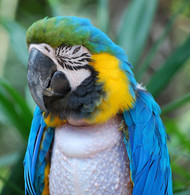Feather Plucking Psychological Factors Part 2 of 2
Posted by feather plucking on 25/1/2024
Liz Wilson explains more about the causes of feather plucking.
As explained in my last column (Feather Destruction - Environmental Factors - Part I of II), Feather Destructive Behaviours (FDB) or feather plucking are a symptom of an underlying stress.
In a brief review of the previous column, environmental stressors include sleep deprivation, malnutrition, improper size and location of cage, inadequate bathing, proximity to predatory pets and/or children, exposure to toxic substances such as cigarettes.

Tension in the home was also listed as an environmental stressor, and this subject also forms the foundation of psychological stressors that our companion Parrots can encounter when living in the human habitat. Humans really need to be aware of the extraordinary impact they can have on their Parrots.
Owners
An excellent example of this occurred repeatedly when I still boarded Parrots in my home. On arrival to drop off their bird, owners often complained that their Parrot had been ?really wound up? for the last few days. ?Of course it has,? I would say. ?You were getting ready to go out of town.?
Owners would invariably respond that the bird didn?t know they were leaving, as ?it didn?t see our suitcases.? I would laugh and point out that Parrots do not need to see suitcases to realize something significant was about to happen. All they had to do was watch the change in their humans? behaviour, as their people got excited about their trip.
I have encountered the same thing repeatedly with my own Blue and Gold Macaw Sam. She becomes extremely excitable ten days prior to my departure to lecture at large veterinary conferences, which tells me how nervous I am about speaking at such venues!
The most dramatic example of empathic connection such as this happened to my dear friend Barbara. A few years ago, she was caring for an extremely ill relative for months in her home, and her nursing duties were taking up 90% of every day, and 110% of her energy. Then more relatives came to visit which exponentially compounded the problem, and Barb was totally frazzled and exhausted.
Maggie
Then one night when she was putting her African Grey Maggie to bed, the bird emphatically expressed her opinion about the entire situation. Making direct eye contact with Barb, Maggie ? who had never been feather destructive in her fifteen years of life - reached down and yanked out a mouthful of feathers, made eye contact again, and spat the feathers out. She then turned her back and refused further interaction.
My friend said later that she heard my voice in her head at that moment, saying, ?Don?t react!? so she did nothing and went to bed (and had a terrible time sleeping). She was relieved the next morning to find the Grey had removed no more feathers, and called me immediately.
After hearing the story, I recommended that Barbara start giving ten minutes of concentrated time to Maggie every day with no intrusions, no matter what. She started that very day, announcing to the family that she and Maggie were going to spend a few minutes together and they were not to be interrupted.
She then took the Grey into another room where they looked out the window together and talked about things. Barbara also explained the situation with her family to Maggie, and apologized for neglecting her over the last several months.
Barb
Maggie didn?t damage her feathers again, despite Barb?s continuing as caregiver for several more months. And what was even more important to me, my beloved friend found those few precious minutes a day with Maggie strengthened her immeasurably, allowing her to continue to provide round-the-clock nursing without the strain she?d encountered previously.
So the Grey?s empathic behaviour helped my friend survive an extraordinarily nerve-racking period in her life.
Owners of FDB Parrots frequently talk about how ?it breaks their heart? that their Parrots are feather destructive. Also frequently heard are phrases like, ?it tears my heart out? when such behaviours are witnessed. Empathic as I believe that Parrots are, I am positive that the birds are aware of this maelstrom of negative emotions.
Like a small child who senses distress in his/her parents that is focused on them, I believe that worried owners are heaping more anxiety on an already potentially stressed bird. So FDB bird owners should get their birds vetted and perhaps work with a Parrot behaviour consultant. They should NOT stand around worrying because they are likely to make the feather plucking situation worse.
FDB
One last note about FDB: Once avian vets have given their bird a clean bill of health and owners have corrected any environmental stressors, the best thing they can do is relax about their bird and its feathers. Contrary to the input from uneducated people, having a feather destructive bird does not automatically mean people are terrible owners or that their Parrots are unhappy.
Like many behaviours, feather destruction can be habit forming, becoming a comfort behaviour rather like chewing one?s fingernails. I have known several feather destructive birds that are obviously happy and healthy and living an excellent life, and their lack of feathers in no way detracts from their lives as a companion Parrot.
Find products that can stop your Parrot feather plucking here.

